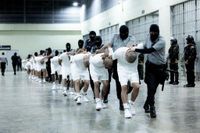On March 24, 2025, a law firm took a bold step by presenting a habeas corpus lawsuit to El Salvador’s Supreme Court in defense of 30 Venezuelan citizens jailed in the country’s controversial mega-prison after being deported there by the United States. This unprecedented legal action arises from the recent deportation of 238 Venezuelans to El Salvador, with U.S. authorities accusing them of being members of the Tren de Aragua gang, a notorious criminal organization.
The legal team, led by lawyer Jaime Ortega, aims to question the legality of the detention of these individuals, emphasizing that these Venezuelans had granted power of attorney for their representation. Ortega stated, “We are demanding first that they be immediately released, and failing that, that there be an orderly and systematic transfer and repatriation as required by our immigration laws.” The case is significant not only for the affected individuals but also amidst escalating tensions surrounding U.S. immigration policies.
Venezuela’s government, along with a committee of family members, sought the firm’s representation, highlighting the widespread concern about the treatment of deported individuals. Of particular note, 137 of the Venezuelans were deported under a rarely used U.S. wartime law that targets what it designates as “alien enemies.” However, in a surprising turn of events, a U.S. judge blocked the flight that was to transport these individuals, ordering it to turn around. Nevertheless, the Venezuelan citizens were subsequently processed in El Salvador, where they were placed in a massive anti-terrorism prison under an agreement in which the U.S. government is reported to be paying El Salvador an estimated $6 million.
U.S. Judge James Boasberg recently ruled that these migrants must be given the opportunity to contest the government’s assertion that they are affiliated with gang activities. His ruling came as he acknowledged disconcerting reports about the prison conditions within El Salvador's mega-prison. These accounts describe severe overcrowding, inadequate access to food and water, and reports of severe beatings and humiliations inflicted upon the detained migrants. “Judges in charge of the case are allies of President Nayib Bukele,” creates an additional layer of concern about impartiality and the overall treatment of detainees.
The mega-prison, located approximately 70 kilometers (44 miles) from the capital San Salvador, covers an area of 23 hectares and has been promoted by local authorities as the largest prison facility in Latin America. Reports regarding the prison have painted a troubling picture; detainees reportedly find themselves sleeping in overcrowded conditions, sometimes having to sleep standing due to the lack of space.
Family members and lawyers working on behalf of the detained Venezuelans assert that their relatives have no connections to the Tren de Aragua gang and vehemently deny the accusations against them. This situation comes at a time when the U.S. government is actively pursuing a policy of mass deportations, which seeks to arrange for various Latin American countries to agree to accept repatriated foreign nationals. Observers note that this collaboration serves the dual function of offloading the responsibility of detained individuals from the United States while garnering significant financial benefits for the nations agreeing to accept the deportees.
The United States has faced increased scrutiny of its treatment of migrants, particularly in light of a broader context of migration crises affecting Central America. The debate over the morality of deportations has intensified, especially when dealing with populations fleeing violence and poverty. As the case unfolds, it deepens the existing tensions between the United States and several countries in the region, many of which have experienced an influx of migrants due to deteriorating conditions.
Lawyer Jaime Ortega’s firm is set to challenge the legality of the detention of the Venezuelan citizens, maintaining that the due process afforded to the migrants has been neglected. This overarching legal premise will be key as the case proceeds through the Salvadoran judicial system and could set a significant precedent concerning the treatment of deported individuals. As Ortega stated, the firm is committed to ensuring fair representation and must navigate through not only the legal framework but also the complex political landscape.
The increasing number of deportations and the existing policies that facilitate such actions raise significant questions regarding international human rights responsibilities. Observers in the realm of human rights advocate for stricter adherence to legal standards of treatment for migrants. The wider context hints toward a broader systemic issue linked to how countries - especially in the Americas - manage migration in the face of crises that forcibly displace individuals.
In the United States and leading Latin American governments, discussions are increasingly focusing on the balance between enforcement and humanitarian obligations. As the judicial process continues to unfold in El Salvador, it remains essential for observers and advocates alike to monitor treatment conditions and acknowledge the voices of those impacted by these legal and political maneuvers.
This situation not only represents a challenge for individuals facing deportation and detention but also reflects on the broader issue of how nations engage with their international responsibilities regarding human rights and immigration laws.
El Salvador’s presidential office has yet to respond to requests for comments about the alleged conditions within the mega-prison, leaving many questions unanswered. As the world watches how these legal proceedings will unfold, the call for accountability and transparency surrounding the treatment of deported Venezuelans remains a pressing issue.
The outcome of this lawsuit could resonate far beyond the borders of El Salvador, providing a critical precedent for similar cases across the region and potentially affecting future policies on immigration and deportation practices between the United States and Central American nations.

